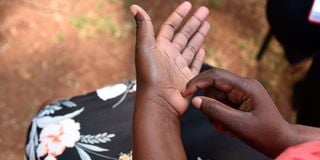Stop the violence on women, girls with disabilities

A woman who underwent tubal ligation without her consent shares her experience in Karen, Nairobi on February 7, 2023. Many cases of women who visit clinics for antenatal care but are allegedly sterilised have been reported.
What kind of investment is needed to prevent violence against women and girls? This being the theme of this year’s 16 Days of Activism against Gender-Based Violence (GBV), let us amplify issues around women and girls with disabilities not often in the mainstream conversation.
GBV in the form of forced sterilisation is a violent act that uniquely affects women and girls with disabilities. This cruel, torturous, egregious, inhumane and criminal act is administered without the victim’s full understanding, doused in misinformation to void consent.
It is mostly performed on women and girls with disabilities when they are very young or through manipulation and intimidation, where they are made to believe that, with their own disability to “worry about”, they would not be capable of carrying or caring for a child.
Interfering with the natural workings of a person’s body is gross violation of dignity, integrity, psychology and autonomy and freedom of choice.
Many a happily pregnant woman with disabilities has been looked at with pity and asked, “Oh dear, who did this to you?” Let’s not forget menstrual suppressants just because they are less invasive and don’t involve the cutting of a reproductive organ. Medics use this option to avoid deeper scrutiny.
Those who can access and afford use oral contraceptive pills (OCPs) to avoid a menstrual cycle when on vacation, during a personal life event or for family planning, for example.
But OCPs are also used covertly on women and girls with disabilities without their full knowledge on their impact to the body and future, and often by those closest to them.
Forced sterilisation is a backward and painfully discriminatory response to disability, intersecting with the rights of women and girls in relation to their bodies. It is a coercive measure against menstruation, fertility and a perceived quality of life for women and girls with disabilities, mostly performed by non-disabled men and women conditioned to think in a certain way about disability.
Sadly, it’s backed by traditional beliefs, societal norms, religious fervency and a continued inability to view disability as a human experience.
Parents, carers, medical professionals and the courts continue to rationalise forced sterilisation methods, citing the behaviour of women with disabilities when they are on their period. These include poor hygiene, emotional mood swings and reaction to seeing their own blood.
But honestly, haven’t non-disabled women reading this stained their pants by accident, experienced mood swings and been squeamish by their own blood at times?
Alarmingly, the human rights laws that denounce discrimination and violence against women with disabilities can be used as a guise in coercing them to be sterilised while rationalising it as acting in their best interest.
Yesterday’s International Day of Persons with Disabilities and the 16 special days from November 25 to December 10 are a call to look out for girls and women with disabilities.
- Ms Asige is a nominated senator. [email protected].





